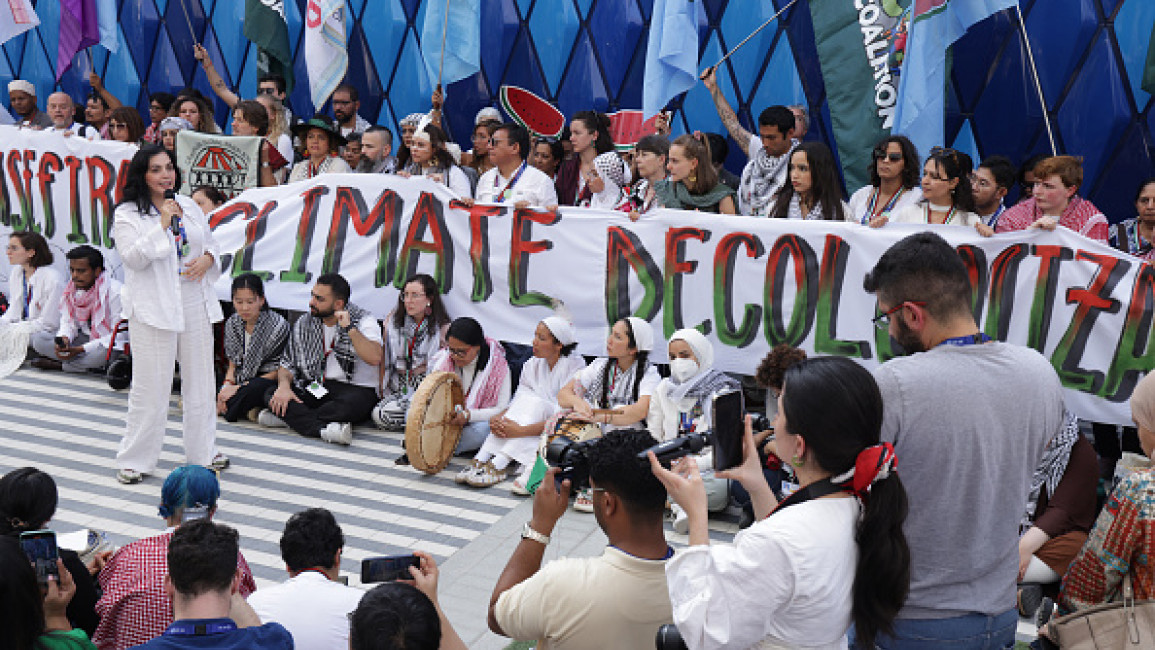'To boycott or not to boycott': Moroccan activists brawl over COP28 amid Gaza war
In the shadows of Israel's war on Gaza and the rising mistrust in world leaders, several Moroccan activists have decided to boycott COP28 in Dubai. Many others flew to the UAE, arguing the importance of engagement in the summit.
The division has led to a brawl among the community and a heated discord about the efficiency of boycotts, greenwashing and the double standard in the UN circles.
"Climate summits like COP28 provide a platform for corporate greenwashing, silencing grassroots voices," wrote BDS Morocco, a local organisation affiliated with the Boycott, Divestment, Sanctions international movement.
BDS Morocco, a rising boycott power in the North African state, has cited five reasons behind their campaign against the climate summit in Dubai. Namely, the presence of over twenty representatives from Israel, including companies involved in illegal settlements and water exploitation in the occupied lands.
COP28 is the most important event on the climate calendar. The annual global meetup this year is taking place in Dubai in the United Arab Emirates from 29 November until 12 December.
On the second day of the summit, Israeli President Isaac Herzog spent his day meeting with world leaders and shaking hands with Arab politicians in the climate talks in Dubai. The same day, his country’s army dropped leaflets around southern Gaza, warning residents to flee as the war in the strip resumed after a short humanitarian pause.
Herzog's participation was the tipping point that prompted numerous Moroccan activists to decide on boycotting.
"You can’t talk about saving the planet while you are hosting on board a war criminal who is currently committing genocide," Omar, a Moroccan activist who decided at the last minute to skip the summit, told The New Arab.
In the first few hours after the truce expired on the morning of 29 November, Israeli bombardments killed dozens across all areas of the Gaza Strip, including the south, which Israel had said was a safe area. Over 16,000 have died so far in the strip, including 7,112 children.
Furthermore, not everyone is happy that COP28 is taking place in the UAE, one of the top five oil-producing countries in the world.
This is compounded by the fact that the man the UAE has called upon to serve as president for this year's event is Sultan Ahmed Al Jaber, the head of Adnoc, the UAE's biggest oil company.
Swedish Climate activist Greta Thunberg has called the decision "completely ridiculous." Thunberg, who skipped this year's gathering, has also voiced support for Palestinians since the start of the war stressing that there's "no climate justice in an occupied land."
"Genocide is not self-defence, nor is it in any way a proportionate response," wrote the Swedish branch of the climate movement Fridays for Future (FFF), best known for activist Greta Thunberg, on Tuesday, 5 December.
'Boycott is not the solution'
"Boycotting could be a short-term solution. (...) If you'd asked me about an alternative to such passive politics (boycott), it is active politics," Mohammed, a Moroccan activist, attending this year’s COP in Dubai, remarked to TNA.
For Mohammed, and several other Moroccan activists attending this year, boycotting will only lead to silencing further activists and leaving bigger space for fuel lobbyists to exercise their influence.
"Occupying space and using our privilege as attendees to make the voices of Palestinians heard is one of our duties as environmentalists," Sara, who is also among the attendees, said to TNA.
More than 100 activists in a COP28 "Blue Zone" venue have demanded a Gaza ceasefire but were not allowed to raise the Palestinian flag or to chant "certain slogan" by the UN committee that controls the space.
The controversy around the climate summit is not new. Over the past few years, several activists have voiced their disappointment in the UN gathering that has failed so far in reaching serious solutions despite the escalating impacts of climate change.
And as the world has failed so far in stopping the ongoing killing in Gaza, mistrust in the UN and world leaders has grown stronger. Many activists from the region are vowing a long-term boycott of such events, not as an act of despair, but as an act of resilience and rebellion against the world order.


![President Pezeshkian has denounced Israel's attacks on Lebanon [Getty]](/sites/default/files/styles/image_684x385/public/2173482924.jpeg?h=a5f2f23a&itok=q3evVtko)



 Follow the Middle East's top stories in English at The New Arab on Google News
Follow the Middle East's top stories in English at The New Arab on Google News


